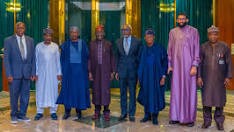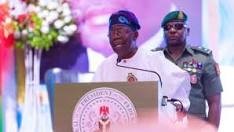President Bola Tinubu received the report from the High-Powered Presidential Committee (HPPC) on Nigeria’s extended continental shelf project yesterday, expressing his gratitude to the dedicated team of experts who have worked tirelessly over the years to advance this significant initiative.
The project is focused on extending Nigeria’s maritime boundaries in alignment with the United Nations Convention on the Law of the Sea (UNCLOS) of 1982. This extension is crucial for Nigeria as it aims to secure additional maritime territory that could be rich in natural resources, enhancing the nation’s economic and strategic interests.
During the ceremony in Abuja, President Tinubu lauded the committee’s efforts following detailed technical presentations by key members of the team. Professor Larry Awosika, a distinguished marine scientist, and Surveyor Aliyu Omar, Secretary of the HPPC, delivered comprehensive updates on the project’s progress and the scientific methodologies employed.

The initiative to extend Nigeria’s continental shelf began with the country’s initial submission to the United Nations Commission on the Limits of the Continental Shelf (CLCS) in 2009. Since then, these experts have been instrumental in conducting the necessary research and compiling the extensive data required to support Nigeria’s claim. Their continued commitment to the project underscores the strategic importance of securing Nigeria’s maritime boundaries in accordance with international law.
The experts informed President Tinubu that the United Nations has approved Nigeria’s submission, granting the country sovereignty over additional square kilometers of maritime territory.
In a statement released by the Special Adviser to the President on Media and Publicity, Chief Ajuri Ngelale, the President remarked, “When the HPPC briefed former President Muhammadu Buhari in 2022 on the status of the project, the United Nations Commission on the Limits of the Continental Shelf (CLCS) was still reviewing Nigeria’s submission and conducting technical consultations with the HPPC.”
Nigeria has been granted permission to extend its continental shelf beyond 200 nautical miles (M) as a consequence of these studies and discussions. Surveyor Omar told the President that the area currently designated for Nigeria is roughly 16,300 square kilometers, or almost five times the size of Lagos State.
He added that the United Nations Commission on the Limits of the Continental Shelf (CLCS) officially notified Nigeria of this judgment in August 2023, not long after President Tinubu took office. The Nigerian marine domain is greatly improved by this extension, which also presents new opportunities for resource management and commercial exploitation.
Omar outlined the available options for Nigeria following the UN’s approval: “The first option is to take the area gained, finalize the registration with the UN Secretary-General, and conclude the process, indicating our satisfaction with the results. This will take at least one year.”
“The second option is to accept the current gains, gather additional data, prepare a supporting write-up, and make a revised submission as recommended by the CLCS for further consideration. This process will take another four years. Regardless of the option chosen, Nigeria will retain the approved area.”

During his talk, Professor Awosika detailed how years of rigorous scientific study in the fields of geophysics, geology, geography, and diplomacy had resulted in the approval, which guaranteed Nigeria’s legal rights over a sizable area of the seabed and subsoil outside of its customary territorial waters.
Awosika emphasized the newly acquired territory’s economic potential, citing its abundance of solid minerals, gas, hydrocarbons, and sedentary animals. Nonetheless, he issued a warning, stressing that Nigeria plans to sell this information to cover project costs, and advised against the complete exposure of sensitive data collected during surveys.
In response, President Tinubu thanked the experts for their dedication and hard work, stressing the importance of this achievement for Nigeria’s economic and strategic interests. He acknowledged the project’s significant impact, which promises to bolster the nation’s resource base and enhance its maritime sovereignty.
The UN’s recognition of Nigeria’s expanded continental shelf is a historic decision with enormous future implications. Through access to undeveloped minerals, gas, and hydrocarbons, it presents significant economic opportunities that might strengthen Nigeria’s economy and energy security.
To optimize these advantages, however, cautious planning for future submissions and the smart handling of sensitive data are essential. Nigeria’s marine sovereignty is reinforced by this breakthrough, which also emphasizes the value of international collaboration and scientific research in defending national interests. It might provide significant long-term economic and geopolitical benefits to the nation if handled well.
Sources
- https://punchng.com/nigeria-gains-marine-territory-five-times-lagos-size/?amp
- https://www.premiumtimesng.com/news/top-news/694499-nigeria-gains-additional-maritime-territory-as-tinubu-recieves-committees-report.html
- https://www.vanguardngr.com/2024/05/nigeria-gains-additional-territory-five-times-the-size-of-lagos/amp/




